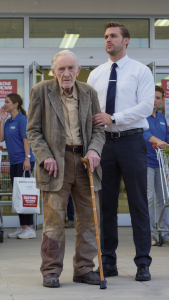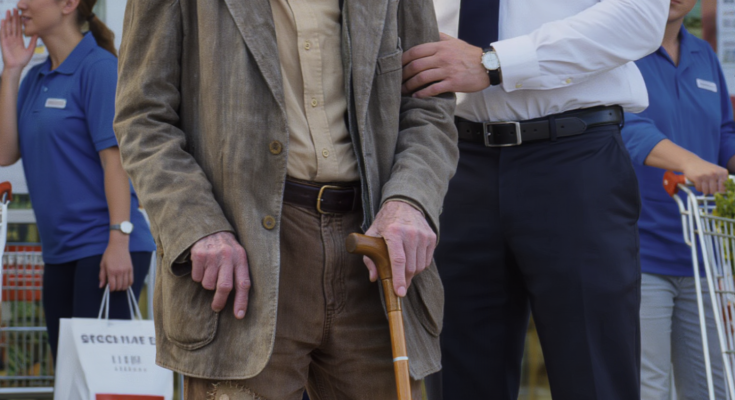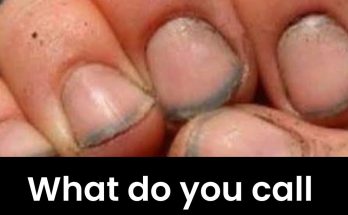The Weight of Ninety Years
At ninety years old, I never thought I’d be the kind of man sharing his life story with the world. But there’s something about growing old that strips away pride and vanity. You stop worrying about how the world sees you and start caring about what truly matters — truth, kindness, and legacy.
My name is William Hutchins, though most people just know me as Mr. Hutchins, founder of Hutchins Markets — one of the largest grocery chains in Texas.
My journey began more than seventy years ago, right after the war, when bread was five cents and people still left their doors unlocked. I started with a single shop on a quiet corner in Houston. I stocked shelves by hand, slept in the backroom, and served customers by name.
Decades later, that humble store grew into hundreds. My name was printed on signs across five states. Newspapers called me “The Bread King of the South.”
But behind the fame and fortune, my nights were silent. My wife passed away in 1992, and we never had children. My business empire grew, but my home stayed empty.
And one lonely evening, as the clock ticked in my study, I asked myself a painful question:
Who will inherit everything I’ve built?
I knew the answer wasn’t my executives — men who cared more for profits than people. It wasn’t lawyers, either, with their perfect smiles and polished shoes.
I wanted someone who understood dignity, compassion, and kindness when no one is watching.
So, I decided to test the heart of my own creation.
The Disguise
One cool autumn morning, I pulled out a tattered jacket, rubbed dirt across my face, and skipped shaving for a week. When I looked in the mirror, the man staring back at me wasn’t a billionaire or a businessman — he was just an old man who looked tired of the world.
I walked with a limp and made my way to one of my own supermarkets. The moment I stepped inside, I felt the stares.
A cashier wrinkled her nose. “He smells like garbage,” she whispered to her coworker. They both laughed.
A man in line pulled his son closer. “Don’t stare, Tommy. People like that… you stay away from them.”
Every step I took was heavy. I looked around at the store I had built — bright lights, full shelves, smiling posters — and yet not a single person smiled at me.
Then it happened.
The floor manager, Kyle Ransom, approached. I had personally promoted him years ago after he saved a warehouse from fire. Now he looked at me like I was filth.
“Sir,” he said sharply, “you need to leave. Customers are complaining. We don’t want your kind here.”
My kind.
I was the man who paid his salary, built his future, and gave him every opportunity he had.
But I didn’t say a word. I simply turned to go.
And then, a soft hand stopped me.
The Sandwich
He was young — late twenties, perhaps. His shirt sleeves were rolled up, and his tie had seen better days. His name tag read Lewis – Junior Administrator.
“Come with me, sir,” he said gently. “Let’s get you something to eat.”
I shook my head. “I don’t have any money.”
He smiled — a quiet, genuine smile. “That’s okay. You don’t need money to be treated with respect.”
He led me into the staff lounge. The fluorescent lights buzzed overhead as he poured me a cup of coffee and placed a wrapped sandwich in front of me.
“You remind me of my dad,” he said softly. “He passed away last year. Vietnam vet. He always said that kindness costs nothing, but it can mean everything to someone who’s hurting.”
I stared at the sandwich like it was gold. I wanted to tell him who I was. I wanted to thank him properly. But I didn’t. The test wasn’t over.
I thanked him and left quietly.

The Choice
That night, I sat alone in my study, staring at old photos of the first store. My wife’s smile looked back at me from a frame. I could almost hear her voice whispering, “Find someone with heart, Will.”
So I did.
I rewrote my will that night. Every store, every dollar, every property — I left it all to Lewis.
The Reveal
A week later, I returned to the same supermarket — but this time, I came as myself. Polished shoes. Charcoal-gray suit. My driver opened the door, and the staff rushed to attention.
“Mr. Hutchins!” they exclaimed. “What an honor!”
Even Kyle, the same manager who had thrown me out, nearly tripped over himself trying to shake my hand.
Across the aisles, I saw Lewis. He didn’t look shocked or nervous. He just gave me a quiet nod — the kind that says, I understand.
That evening, he called.
“Mr. Hutchins,” he said. “I knew it was you. But I didn’t help because of who you are. I helped because you needed kindness. That’s all that mattered.”
My heart knew, then, I had found the right person.
The Letter
A few days later, just before signing the final transfer papers, an anonymous envelope arrived on my desk. Inside, one line:
“Don’t trust Lewis. Check Huntsville Prison Records, 2012.”
My hands trembled. I asked my lawyer to investigate. Hours later, the report came back — Lewis had been arrested for car theft at age nineteen and served eighteen months.
I felt betrayed. But I needed to hear it from him.
When I called him in, he didn’t look scared. He looked ready.
“Yes, sir,” he said. “It’s true. I made a terrible mistake when I was young. I paid for it, and I learned from it. Prison taught me who I didn’t want to be. That’s why I try to treat everyone with dignity. Because I know what it’s like to lose it.”
There were no excuses — only truth. And I realized that mistakes don’t define a man. What he becomes afterward does.
Family vs. Compassion
When word spread that I was changing my will, long-lost relatives began showing up.
My niece, Denise, arrived first — perfectly dressed, perfectly angry.
“Uncle,” she said sharply, “you can’t leave your fortune to some ex-convict. You have family!”
“You haven’t called me in twenty years,” I replied.
“That’s not the point—”
“No,” I interrupted. “That is the point. Lewis treated me like family when my own family did not.”
That night, I caught her snooping in my study, trying to find my will. When I confronted her, she hissed, “If you go through with this, I’ll destroy him.”
For the first time, I wasn’t afraid for myself. I was afraid for Lewis.
The Truth and the Legacy
I invited Lewis to my home the next morning. I told him everything — the disguise, the test, the inheritance, the letter, and my family’s threats.
When I finished, he looked down, then met my eyes.
“Mr. Hutchins,” he said quietly, “I don’t want your money. I just wanted to show you that there are still people who care. If you leave me your fortune, your family will make my life a battlefield. Use it for something greater.”
His words hit me like lightning.
So I did.
I poured every asset, every building, every penny into the Hutchins Foundation for Human Dignity. Its mission: to feed the hungry, provide shelter for the homeless, and give second chances to people who have made mistakes.
And I named Lewis as its lifelong director.
When I handed him the final papers, his voice trembled.
“My father used to say, ‘Character is who you are when no one’s watching.’ You’ve proven that today. I’ll make sure your name stands for kindness long after we’re gone.”
The Final Reflection
I am ninety now. My hands shake when I write, but my heart is steady.
I no longer own a fortune — I own peace. I found my heir not through blood or wealth, but through compassion.
Lewis once said something I’ll never forget:
And that, my friends, is the truth I’ll carry to my final day.
Because wealth fades, buildings crumble, and names disappear — but kindness?
Kindness lasts forever.




